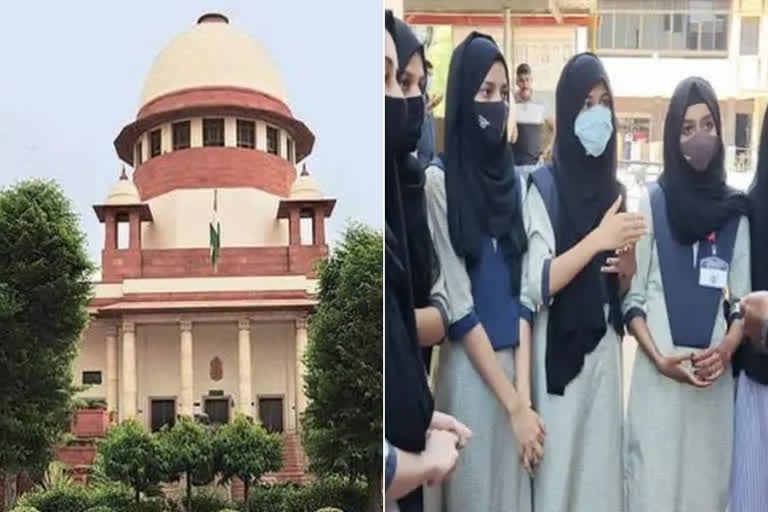New Delhi: A special leave petition has been filed in the Supreme Court on Tuesday against the Karnataka High Court verdict in which it upheld the state government's ban on wearing Hijab in schools and colleges while ruling that headscarf was not an essential religious practice of Islam.
The plea has been filed by Niba Naaz who had also filed the plea in the High court against the Karnataka government's order issued under section 7 and 133 of the Karnataka Education Act,1983, wherein it directed the colleges to prescribe a student uniform and in case of its absence, wear an uniform that would be in essence of unity, equality and public order. The petition says that the High Court failed to note that the Indian constitution recognises wearing and carrying religion symbols including, for instance, Sikhs not mandated to wear helmet, and allowed to carry kirpan to aircraft etc.
The petitioner contended that the order of the Karnataka government has an "indirect intent of attacking religious minorities and specifically the followers of Islamic faith by ridiculing the female Muslim students wearing Hijab" under the guise of secularity and equality.
The plea said that the Karnataka HC "failed to understand" the core aspect of essential religious practices enshrined under Article 25 of the constitution. Naaz also contended that Karnataka Education Act, 1983 does not provide for a mandatory uniform and deals with regulating institutions. Other act, Karnataka Educational Institutions (Classification, Regulation and Prescription if Curricula etc) Rules,1995 also doesn't make it mandatory to specify uniform and says that educational institutions "may specify" uniforms, thereby not making it mandatory. And in the present case, there was no uniform specified.
"The petitioner submits that the hon'ble High Court has failed to note that there does not exist any provision in law which prescribes any punishment for students for not wearing uniforms. Even if one were to presume that there exist the mandate to wear a particular uniform, there is no punishment prescribed in case a student does not wear the uniform. It is pertinent to know that chapter XVII of the act prescribes penalties for various offences including impersonation during examination, penalty for ragging etc. Furthermore, rule 15 of the 1995 rules prescribe the penalties that can be levied for the violation of any provision of the act or the rules by the institutions."
The plea further read that there does not exist any provision in either the act or the rules there under that describes a punishment for students for not wearing an institution prescribed uniform. "Therefore it is submitted that the action of the respondents in prohibiting the students from accessing classroom is devoid of any legal basis."
She contended that the HC failed to note that Hijab comes under the ambit of expression and is thus protected under fundamental right Article 19(1)(a). It also failed to note the shift of burden of maintaining public order from the state to public, making wearing Hijab the sole reason for the issue.
READ: Hijab verdict: From Omar Abdullah to Tejasvi Surya, who said what?



